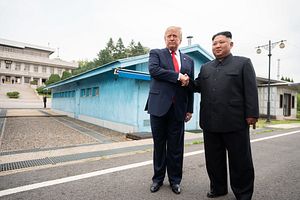On Tuesday, a spokesperson for North Korea’s Ministry of Foreign Affairs released two notable statements on the state of diplomatic play between Washington and Pyongyang. The statements swiped at recent optimism from U.S. officials, including Secretary of State Mike Pompeo, that working-level talks were about to begin imminently.
The reconvening of those talks was the major outcome of the Trump-Kim meeting on June 30 at the inter-Korean Demilitarized Zone — at least according to the public readouts of that meeting from the U.S. side.
What the latest Foreign Ministry statement added was ominous. It warned that the upcoming U.S.-South Korea military exercises — the so-called 19-2 Dong Maeng, or Alliance, drills — would derail talks.
“When working-level talks between the DPRK and the U.S. are on the calendar… the U.S is attempting to stage joint military drills ‘DongMaeng 19-2’ with South Korea, violating the commitment made at the top level,” the spokesperson said. “If they become a reality, it will affect the DPRK-U.S. working-level negotiations.”
Most significantly, one of the statements noted that the exercises would not only violate the June 12, 2018, commitments made by Trump and Kim at their first summit in Singapore, but that they would also violate a pledge Trump had given Kim during the third, most recent summit.
“The suspension of joint military exercises is what President Trump, commander-in-chief of the U.S., personally committed to at the DPRK-U.S. summit talks in Singapore under the eyes of the whole world and reaffirmed at the DPRK-U.S. summit meeting in Panmunjom, where our Foreign Minister and the U.S. Secretary of State were also present,” the Foreign Ministry spokesperson noted.
The Trump administration did not note in any readouts or statements after the third Trump-Kim meeting that the U.S. side had agreed to call of the exercises. Trump, when asked about the latest North Korean statements, did not address the issue of the exercises.
Instead, the U.S. president emphasized that he and Kim still enjoyed a “very good relationship” and that the two sides had made “tremendous progress.” “We’ll see what happens,” Trump added. “I’m in absolutely no hurry — we can probably do something that will be very good for them and for everybody and the world.”
The North Korean side has exposed a rift that could grow quite serious. If Trump made a commitment to Kim on military exercises, as he had done — and announced — in Singapore regarding the Ulchi-Freedom Guardian 2018 exercises, then proceeding with the 19-2 Dong Maeng drills would likely nip in the bud any change of the U.S.-North Korea working-level process resuming.
If Trump did tell Kim that exercises would be cancelled, it’s unclear if there were prior consultations with South Korea. Trump’s Singapore announcement was unilateral, but given that the Panmunjom U.S.-North Korea summit followed extensive bilateral consultations between the United States and South Korea — and that Moon Jae-in, the South Korean president, was present — the two sides may have communicated on the matter.
The North Korean statements are not surprising in their opposition to the exercises. Pyongyang has always bristled at major allied activities south of the DMZ. What is surprising is the assertion that Kim had been given a pledge concerning the upcoming exercises. Without clarity, the rocky U.S.-North Korea process might quickly lose whatever momentum the June 30 summit had injected.

































